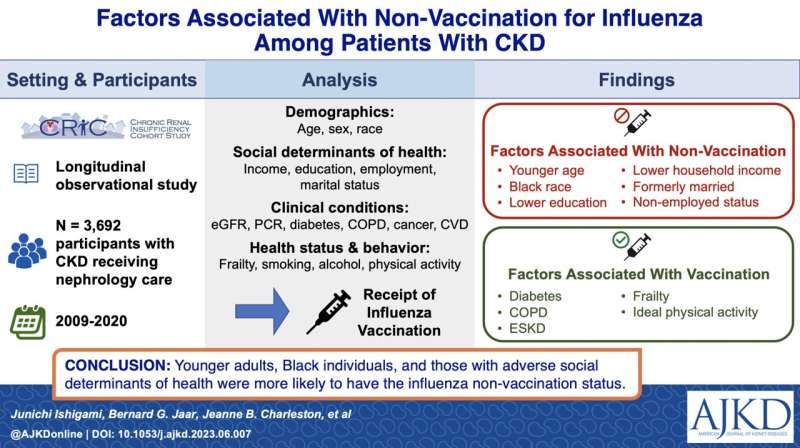This article has been reviewed according to Science X's editorial process and policies. Editors have highlighted the following attributes while ensuring the content's credibility:
fact-checked
peer-reviewed publication
proofread
Disparities in flu vaccine uptake persist in people with kidney disease: Study

Among adults with chronic kidney disease (CKD) enrolled in the Chronic Renal Insufficiency Cohort (CRIC), young age, Black race, and low levels of education and income were associated with lower likelihood of getting an annual flu shot.
Identifying risk factors for not receiving a flu vaccine ("non-vaccination") in people living with kidney disease, who are at risk of flu and its complications, could inform strategies for improving vaccine uptake.
In this study published in the American Journal of Kidney Diseases, researchers led by Junichi Ishigami examined whether demographic factors, social determinants of health, and clinical conditions were linked to the status of not receiving a flu vaccine among people living with kidney disease and receiving nephrology care.
The authors found that the pooled mean influenza vaccine uptake between 2009 and 2020 was 72%. Younger individuals, Black individuals, and those with adverse social determinants of health were less likely to receive an influenza vaccine. In contrast, those with diabetes, COPD, ESKD, and frailty were less likely to have the influenza non-vaccination status.
These findings have important implications. Their finding of <80% vaccine uptake (or only 44% of participants consistently receiving an influenza vaccine every year surveyed) indicates room for improvement in vaccine uptake for people with CKD. While it was unknown whether participants in this study received their influenza vaccines at a nephrology clinic (versus at primary care clinic, a pharmacy, etc.), the optimal role of nephrology care in promoting vaccination should be explored in future studies.
Efficiency of vaccine efforts for people with CKD may be improved by targeting those who have barriers to vaccination (e.g., younger adults, Black individuals, those with adverse social determinants of health). To date, few data exist regarding the effectiveness of vaccination programs in nephrology care, outside of quality improvement projects in dialysis centers. Importantly, nephrology care may represent an important opportunity to increase vaccine uptake in patients with CKD by leveraging trusted relationships between nephrologists and patients.
Additionally, involving patient-level stakeholders (e.g., family members, caregivers) may help reduce barriers and provide social support and accountability for preventive health care. Future studies should examine reasons behind vaccine hesitancy (e.g., concerns about side effects, inconvenient access to vaccination), so vaccination programs can be tailored to address these concerns.
More information: Junichi Ishigami et al, Factors Associated With Non-Vaccination for Influenza Among Patients With CKD: Findings From the Chronic Renal Insufficiency Cohort (CRIC) Study, American Journal of Kidney Diseases (2023). DOI: 10.1053/j.ajkd.2023.06.007



















